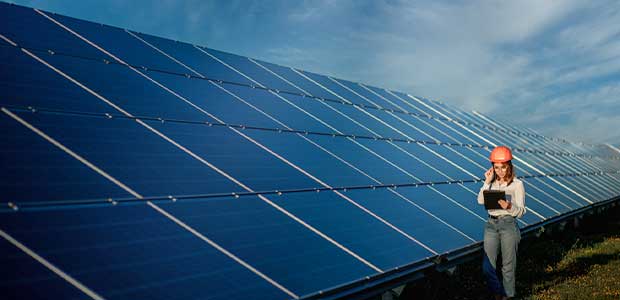Exactly How Solar Energy Can Help You Save Cash and Minimize Your Carbon Footprint
The integration of solar power right into your power profile offers an engaging chance for both financial savings and environmental stewardship. By utilizing the sunlight's energy, home owners can dramatically minimize their month-to-month energy costs while likewise protecting against the changability of future power costs. Moreover, the shift to solar adds to a marked decrease in carbon exhausts, lining up personal money with wider ecological objectives. As numerous government motivations end up being readily available, the question develops: how can one successfully navigate the preliminary financial investments and ongoing benefits of solar technology to make best use of both financial and ecological gains?
Understanding Solar Energy Financial Savings
While the change to solar power usually entails an initial investment, recognizing solar energy cost savings is vital for homeowners and organizations alike. Solar power systems can considerably lower electricity bills by using the sunlight's power, converting into considerable long-term economic benefits. By producing their own electrical power, customers reduce dependence on grid power, which is subject to rising and fall costs. These financial savings can collect over time, commonly bring about a fast return on financial investment.
Additionally, solar energy systems might receive different financial motivations, including tax obligation credits and rebates, additionally enhancing their cost-effectiveness. The schedule of web metering allows individuals to sell excess power back to the grid, creating an added income stream. These variables add to the general savings connected with solar power.

Along with guide financial financial savings, solar power provides the added benefit of boosting home worth. Residences equipped with photovoltaic panels are typically much more eye-catching to customers, as they guarantee lower power expenses - Simply Solar Illinois. Understanding these components is vital for anyone considering solar energy, as it highlights not just the potential economic gains, but likewise the wider environmental and financial advantages of taking on renewable energy services
First Costs vs. Long-Term Perks
When reviewing solar energy, it is very important to consider the initial costs versus the long-lasting advantages. The upfront investment for photovoltaic panels, installment, and relevant devices can be substantial, typically varying from $15,000 to $30,000, relying on the system size and home power requirements. This first expenditure may hinder some property owners; nevertheless, it is vital to consider the prospective cost savings in time.
Once mounted, solar energy systems can dramatically decrease or also eliminate month-to-month power expenses, causing considerable lasting monetary advantages. Researches indicate that homeowners can conserve anywhere from $10,000 to $30,000 over the life-span of their planetary system, typically 25 years. Furthermore, lots of states supply motivations, tax credit scores, and rebates that can offset initial expenses, making solar extra accessible.

Minimizing Your Carbon Impact
Decreasing your carbon footprint is a critical factor to consider in today's ecologically mindful society, and adopting solar energy is just one of one of the most reliable approaches to achieve this goal. Solar power is a clean, renewable energy that significantly diminishes dependence on nonrenewable fuel sources, which are significant contributors to greenhouse gas exhausts.

In addition, the extensive fostering of solar modern technology motivates the advancement of environment-friendly work and sustains technologies in power storage and performance. The more individuals and organizations invest in solar power, the greater the cumulative reduction in carbon exhausts, fostering a cleaner atmosphere for future generations.
Federal Government Incentives and Rebates
Embracing solar energy not just benefits the setting yet can also lead to substantial economic cost savings, specifically with the availability of government incentives and discounts. Numerous federal, state, and local programs are developed to urge house owners and services to spend in solar power systems, making the change much more budget-friendly.
Among one of the most famous motivations is the Federal Financial Investment Tax Obligation Credit Scores (ITC), which allows solar system proprietors to subtract a substantial percent of link the setup prices from their federal tax obligations. This reward has been pivotal in minimizing the in advance expenses linked with solar power systems. In addition, many states provide their own tax obligation credit histories, gives, and refunds that can even more boost savings.
In addition, some city governments supply building tax obligation exceptions for solar installments, making sure that house owners do not encounter enhanced real estate tax as an outcome of their eco-friendly power financial investments. Energy companies may additionally use incentives, including internet metering and feed-in tolls, which enable solar power customers to offer excess power back to the grid.
Picking the Right Planetary System
Picking the ideal planetary system is important for maximizing power effectiveness and economic benefits. The choice rests on numerous elements, including energy needs, budget, and readily available space. House owners ought to start by assessing their electricity consumption to figure out the system dimension required for optimal performance.
Following, consider the different kinds of solar technologies available. Simply Solar Illinois. Solar (PV) panels are the most usual, converting sunshine directly right into electrical power, while solar thermal systems concentrate on heating water. Each kind has unique benefits depending on individual needs
Spending plan factors to consider are also critical. Initial setup prices can vary dramatically, so it is very important to compare quotes from numerous carriers and check out financing choices. Federal government incentives and rebates can additionally lower the financial worry, making solar systems more obtainable.
Final Thought
The ecological advantages of solar this content energy add to sustainable techniques essential for combating climate adjustment. Federal government rewards improve the usefulness of solar innovation fostering, urging a transition in the direction of a cleaner, a lot more financially effective energy resource.